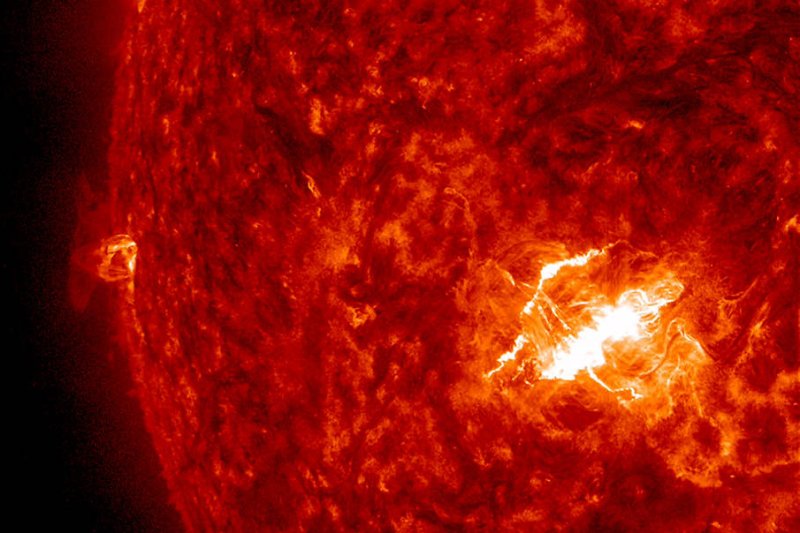A strong flare erupted into space from an active region that was roughly facing towards Earth on March 11, 2015. Photo courtesy of NASA/SDO/UPI
ORLANDO, Fla., Jan. 15 (UPI) -- Physicists are teaming up with computer scientists in a NASA-funded study to help predict solar flares and radiation that can disable spacecraft and potentially kill astronauts.
NASA has awarded a $550,000 grant to the Florida Institute of Technology in Melbourne to begin the three-year machine learning project next month. Computer algorithms will analyze data and imagery from the sun and solar system radiation.
The space agency's goal is to identify warning signs that precede solar radiation events and to better understand their length and severity. Scientists say is important to monitor solar activity and restrict spacewalks when radiation levels are dangerously high.
As NASA plans a base on the moon and trips to Mars, the space agency is ramping up space radiation studies. Radiation from solar energy can affect astronauts, spacecraft electronics, signals from GPS satellites and even commercial jetliners on polar routes. High doses of space radiation could make astronauts too sick to function well enough to get home.
The agency hopes to develop "warnings ahead of time, and also to predict how strong the radiation burst will be, and when it will begin, peak and disappear," said Florida Tech physicist Ming Zhang, the lead scientist on the project.
Florida Tech researchers say scientists have developed models that can predict the timing and strength of radiation bursts from the sun only about half the time -- not accurate enough to generate useful forecasts.
Machine learning should be able to "spot patterns and accelerate the rate of discovery about what causes powerful solar events and when they will occur," said Delores Knipp, space sciences professor at the University of Colorado-Boulder.
Knipp said machine learning is being applied to space weather forecasting because of the huge amounts of data that come from solar observations.
Astronauts during the Apollo program could have suffered debilitating injury or illness from a powerful solar event in 1972 had they been in space, Knipp said.
"It just happened to occur between Apollo missions," she said. "If we had had astronauts in a capsule on the way to the moon or back, they might have been sickened to the point they couldn't have functioned well."
Machine learning also might point to gaps in data about space radiation, Knipp said.
"We are data-starved right now. We need more measurements," she said.
Florida Tech is one of 14 universities NASA picked in November for funding to study an array of topics under the agency's Space Technology Research Grants program.
Other schools awarded funding are Rensselaer Polytechnic Institute, Troy, N.Y.; Purdue University, West Lafayette, Ind.; Auburn University, Auburn, Ala.; the University of Michigan, Ann Arbor; the University of Alabama-Tuscaloosa, and the University of California-Los Angeles.
Also, the University of Central Florida, Orlando; Florida State University, Tallahassee; University of Texas, El Paso; University of Illinois-Urbana-Champaign; New Jersey Institute of Technology, Newark, and Vanderbilt University, Nashville.















